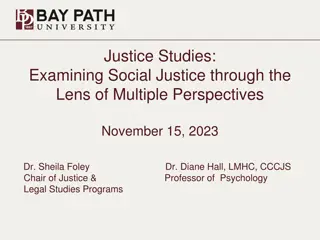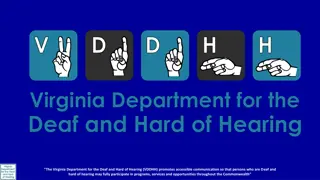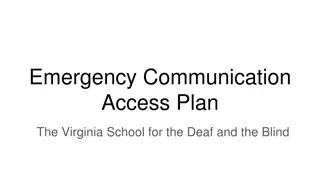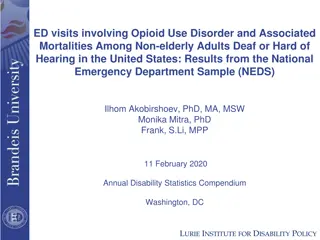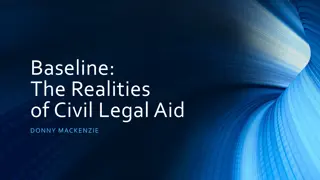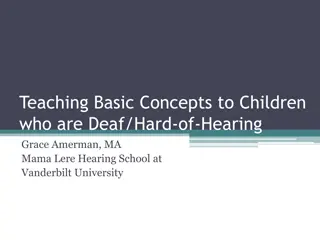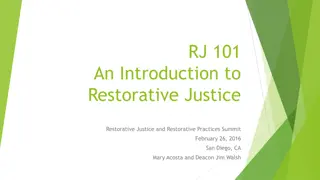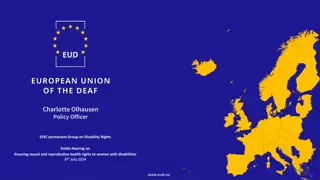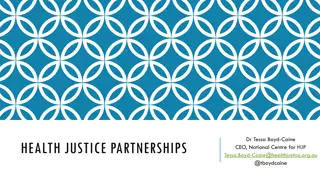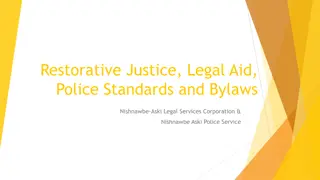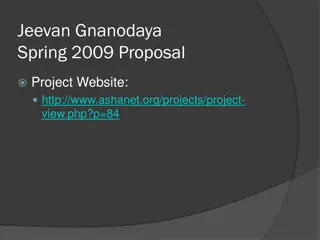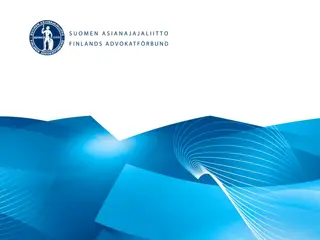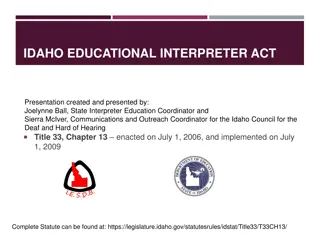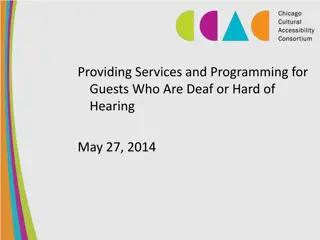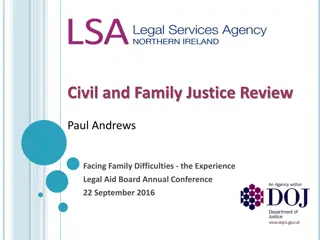Supporting Deaf People's Access to Justice: Insights from Legal Professionals
This research project conducted by Dr. Bronagh Byrne from Queen's University Belfast explores the perspectives and experiences of legal professionals in supporting Deaf individuals in accessing the justice system. The study aims to identify areas for improvement in supporting Deaf people, highlighting key findings such as experiences of working with Deaf individuals, accessing justice services, interpreter services, vulnerability of Deaf prisoners, jury service challenges, and recommendations for training and resource development.
Download Presentation

Please find below an Image/Link to download the presentation.
The content on the website is provided AS IS for your information and personal use only. It may not be sold, licensed, or shared on other websites without obtaining consent from the author.If you encounter any issues during the download, it is possible that the publisher has removed the file from their server.
You are allowed to download the files provided on this website for personal or commercial use, subject to the condition that they are used lawfully. All files are the property of their respective owners.
The content on the website is provided AS IS for your information and personal use only. It may not be sold, licensed, or shared on other websites without obtaining consent from the author.
E N D
Presentation Transcript
Legal Professionals Supporting Deaf Legal Professionals Supporting Deaf People s Access to the Justice People s Access to the Justice System System 21 October 2020 Dr Bronagh Byrne, Queen s University Belfast @BronaghByrneQUB
Background Background Co-produced research project with British Deaf Association (BDA)NI and a Deaf Advisory Group. Funded by Big Lottery Disability Research on Independent Living and Learning (DRILL) initiative, 2017-2019. BDA(NI) Access to Justice consultation, 2016 & research by Schwartz and Elder (2018).
Project Aims Project Aims Explore the perspectives, knowledge, and experiences of legal professionals on Deaf people s engagement with the legal system. Identify ways in which legal professionals can better support Deaf people s access to the justice system. Identify training and resource needs of legal professionals.
Role of the Deaf Advisory Group (DAG) Role of the Deaf Advisory Group (DAG) Rights-based approach to research Overarching principle of the project from beginning to end Expert advisors Nothing about us without us (Charlton 1998)
Methods Methods Group N Focus groups and interviews with legal professionals Solicitors 3 Barristers 3 Police Officers 4 Prison Officers 12 Judges 4 Guided by DAG Tribunal Members 9 Total 35
Research Findings Research Findings
Key Findings Key Findings 1. Legal Professionals Experiences of Working with Deaf People 2. Accessing Services in the Justice System 3. Accessing Interpreters 4. Potential Vulnerability of Deaf Prisoners 5. Jury Service 6. Suggestions for Future Training and Resource Development
Key Findings (cont.) Key Findings (cont.) 1. Legal Professionals Experiences of Working with Deaf People 2. Accessing Services in the Justice System 3. Accessing Interpreters 4. Potential Vulnerability of Deaf Prisoners 5. Jury Service 6. Suggestions for Future Training and Resource Development
Legal Professionals Experiences of Legal Professionals Experiences of Working with Deaf People Working with Deaf People Only because , by doing this you ve triggered that thought in my mind, you know? Why am I not, I mean I ve been a barrister for thirty years and a high court judge now for three years, and I have not had a Deaf person appear in front of me, I haven t been asked to represent a Deaf person, in any capacity whatsoever. So [pause] I m asking myself the question now, is there a problem even before they get to court? (Judge)
I take great pride in the uniform that I wear and I was a little embarrassed about the fact that [the police] had let down this [Deaf] lady because she had to contact [England] police although she lived within a couple of miles of the [local PSNI] station. I thought it was a terrible indictment on the services that we offer. (Police Officer)
Ive had at least one case here where both parents were Deaf, and it was unusual in the sense that I think the father came from Derry and the mother came from Belfast, and the Derry man did Irish sign language and the Belfast mum did British sign language. So, we had to have two interpreters doing British sign language and [Irish] sign language. I thought [since] this is going to be slow; I m going to be able to take notes. But it actually was very complicated, and it took an awful lot of concentration. (Tribunal Panel Member)
Accessing Services Accessing Services We recommend that members of the Deaf community email us through the PSNI website but when I ve looked at that, and the deaf people I ve spoken to, they ve said it s confusing. They said it s too heavy on text, it assumes quite a high standard of literacy. The education system, as I ve been finding out, has let a lot of Deaf people down. The standard of education that they ve received is poor. (Police Officer)
Once theyd heard the plaintiffs evidence, and we had two signers in court, the judge said those interpreters can go home now which meant the deaf person wouldn t have been able to follow the rest of the hearing. And we had to explain to the judge why we needed the interpreters to remain in the courtroom there is such a lot of work to be done just to explain the very basic needs of people with any disabilities in accessing the justice system. (Solicitor)
Tips! Tips! Learn as much as you can about being Deaf Find out how your client communicates Adopt Deaf-friendly practices Adapt Know your protocols Clarify jargon Know your communication professionals Use the same interpreters Give yourself time Don t panic!
For more info: For more info: Full and summary report and range of resources/videos at: https://bda.org.uk/accesstojustice-isl/ Email: Dr Bronagh Byrne, b.byrne@qub.ac.uk or @BronaghByrneQUB To cite: Byrne, B., Elder, B., and Schwartz, M. (2019) Implementing Article 13 UNCRPD: Enhancing Access to Justice for Deaf People, Belfast: BDA(NI).



